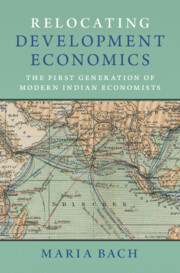
-
Select format
-
- Publisher:
- Cambridge University Press
- Publication date:
- December 2024
- December 2024
- ISBN:
- 9781009438209
- 9781009438193
- Dimensions:
- (229 x 152 mm)
- Weight & Pages:
- 0.432kg, 200 Pages
- Dimensions:
- Weight & Pages:
You may already have access via personal or institutional login
Book description
Originating in the Nineteenth Century, the European idea of development was shaped around the premise that the West possessed progressive characteristics that the East lacked. As a result of this perspective, many alternative development discourses originating in the East were often overlooked and forgotten. Indian Economics is but one example. By recovering thought from the margins, Relocating Development Economics exposes useful new ways of viewing development. It looks at how an Indian tradition in economic thought emerged from a group of Indian economists in the late Nineteenth Century who questioned dominant European economic ideas on development and agricultural economics. This book shows how the first generation of modern Indian economists pushed at the boundaries of existing theories to produce reformulations that better fit their subcontinent and opens up discursive space to find new ways of thinking about regress, progress and development.
Reviews
‘This volume seriously reevaluates economic thought by highlighting the contributions of several late-19th-century Indian economists … Readers interested in the intersections of economics, history, and postcolonial studies will obtain valuable insights into how localized knowledge systems can inform broader economic theories and issues … Highly recommended.’
A. A. Batabyal Source: Choice
Contents
Metrics
Altmetric attention score
Full text views
Full text views help Loading metrics...
Loading metrics...
* Views captured on Cambridge Core between #date#. This data will be updated every 24 hours.
Usage data cannot currently be displayed.
Accessibility standard: Unknown
Why this information is here
This section outlines the accessibility features of this content - including support for screen readers, full keyboard navigation and high-contrast display options. This may not be relevant for you.
Accessibility Information
Accessibility compliance for the PDF of this book is currently unknown and may be updated in the future.


